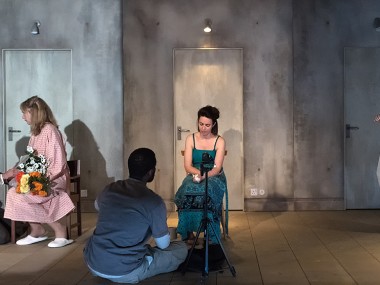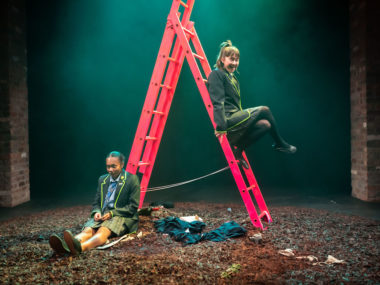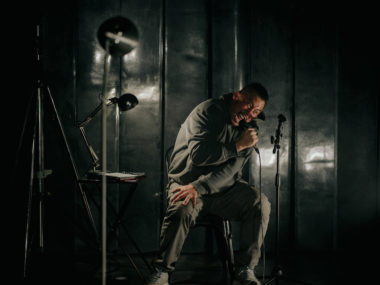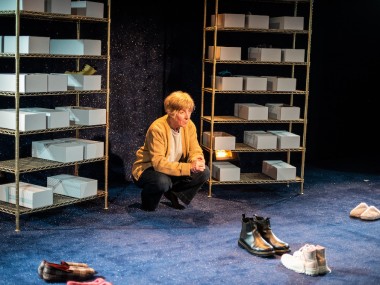Every Brilliant Thing, @Sohoplace
Thursday 21st August 2025

Slowly, very slowly, the audience begins to arrive. Taking their seats, shedding jackets, arranging bags and glancing at programmes. But already, there’s a stir: the imposing figure of actor Jonny Donahoe is at the centre of things, striding across the stage, talking to audience members, recruiting volunteers and handing out slips of paper. There’s a welcoming vibe about all this, a buzz in the air. But also small accidents. Next to me, a woman spills some red wine on her own white jacket. Ouch. I have the feeling that this is going to be a memorable evening.
And I’m right. It is. Duncan Macmillan’s Every Brilliant Thing, first staged at the Ludlow Fringe Festival in 2013, and then in Edinburgh a year later, has since become a contemporary classic, boasting productions in more than 60 countries. The 80-minute monologue begins with the Narrator taking us back to when he was a seven-year-old boy, with a mum who suffers from depression and attempts suicide. His father uses the euphemism “done something stupid”. Shocked by her hospitalization, the little boy starts making a list of every brilliant thing in the world as a way of demonstrating that life is worth living.
This list charts the Narrator’s coming of age, starting with childhood favourites such as “ice cream”, “water fights” and “staying up past your bedtime and being allowed to watch TV”, then moving on to more adolescent interests such as “the even-numbered Star Trek films” and “skinny-dipping”, along with “knowing someone so well they can check your teeth for broccoli”, before arriving at the more grown-up “smell of old books” and “old people holding hands”. As they get older the list of 1,000 and many more items gets longer and longer, expressing the wonder of everyday life, an affirmation of everyday joy that precariously balances the Narrator’s own struggle with depression.
There’s an inclusive feel to the story: childhood, adolescence, university, love and marriage, and of course emotional problems. Jeremy Herrin and Duncan Macmillan’s co-production emphasizes this by casting five different actors: as well as Jonny Donahoe, who originated the role and helped write the piece, they are Lenny Henry, Ambika Mod, Sue Perkins and Minnie Driver. This spread of interpretation correctly implies that the central themes of the story, which are depression, loneliness and suicide, can affect anyone in our society, regardless of age, gender, race or sexuality.
The way that Every Brilliant Thing embraces everything and everyone is exemplified by Herrin and Macmillan’s staging, designed by Vicki Mortimer, which energetically engages with the possibilities of audience participation in this West End theatre-in-the-round. The slips of paper that Donahoe gives out before the show begins contain items from the list of brilliant things, and as he calls out a number an audience member responds by reading out the item. Then he asks other audience members to act out scenes from the story, such as the vet who gives Ronnie Barker, the child’s sick pet dog (a volunteer’s coat), a euthanasia injection (a volunteer’s pen). Other volunteers play the boy’s father and later his lover.
One of the most heartfelt moments is when one of the volunteers plays the Narrator’s school counsellor who takes off a shoe and uses her sock as a hand puppet. And then there is yet another volunteer who acts the part of the university lecturer who reads out the blurb on the back cover of Goethe’s The Sorrows of Young Werther, a 1774 Strum und Drang novel which, it is said, inspired copycat suicides. This provokes the comment that “suicide is contagious”, a sociological reminder — referring to Émile Durkheim — that self harm is not just an individual act, but takes place, and is affected by, social conditions.
Because of the jokes in the writing, and the pleasure of occasionally hilarious audience participation, this is one of those shows which is so enjoyable you don’t fully realize how thin most of the material is. Apart from the list itself, which is made up of items which are instantly recognizable in their soft mundanity and quiet glory, the play’s content is slim. Macmillan argues that suicide is always inexplicable, quotes advice from the Samaritans about how to talk about it and report it, and advocates therapy to relieve depression. None of this is wrong — but it all invites deeper exploration.
The problem is not the joining of serious mental health issues with comedy, a gesture which is common in contemporary theatre, but rather the tilting of the event so much in favour of enjoyable fun instead of thoughtful depth. At one point, the Narrator admits that their compulsion to use humour is a way of avoiding real emotion. Quite. On the other hand, the simplicity of the story, the clarity and openness of its feelings, does make this a very moving experience, as well as one full of laughter. A soundtrack which includes both Curtis Mayfield’s “Move On Up” and Ray Charles’s “Drown in My Own Tears” adds to the pleasure. Avoiding excessive seriousness, the effect is one of uplift and joy in both form and content.
Donahoe has made the role his own, and his ease with audience interaction and improvisation gives the show a wonderfully smooth pace. He perfectly embodies the sense of a slightly awkward character, a kind of shy bloke who is looking for love to come out of his shell, and one of the strong points of the piece is the realistic image of an older man (in this case) looking back at his frightened and bewildered childhood self, then at his gawky loveless youthfulness, before finding and losing adult love. From the audience the response is tears of emotion as well as of joy. Clearly, a brilliant evening.
This review first appeared on The Theatre Times





1 Comment
on Friday 5th September 2025 at 10:18 am